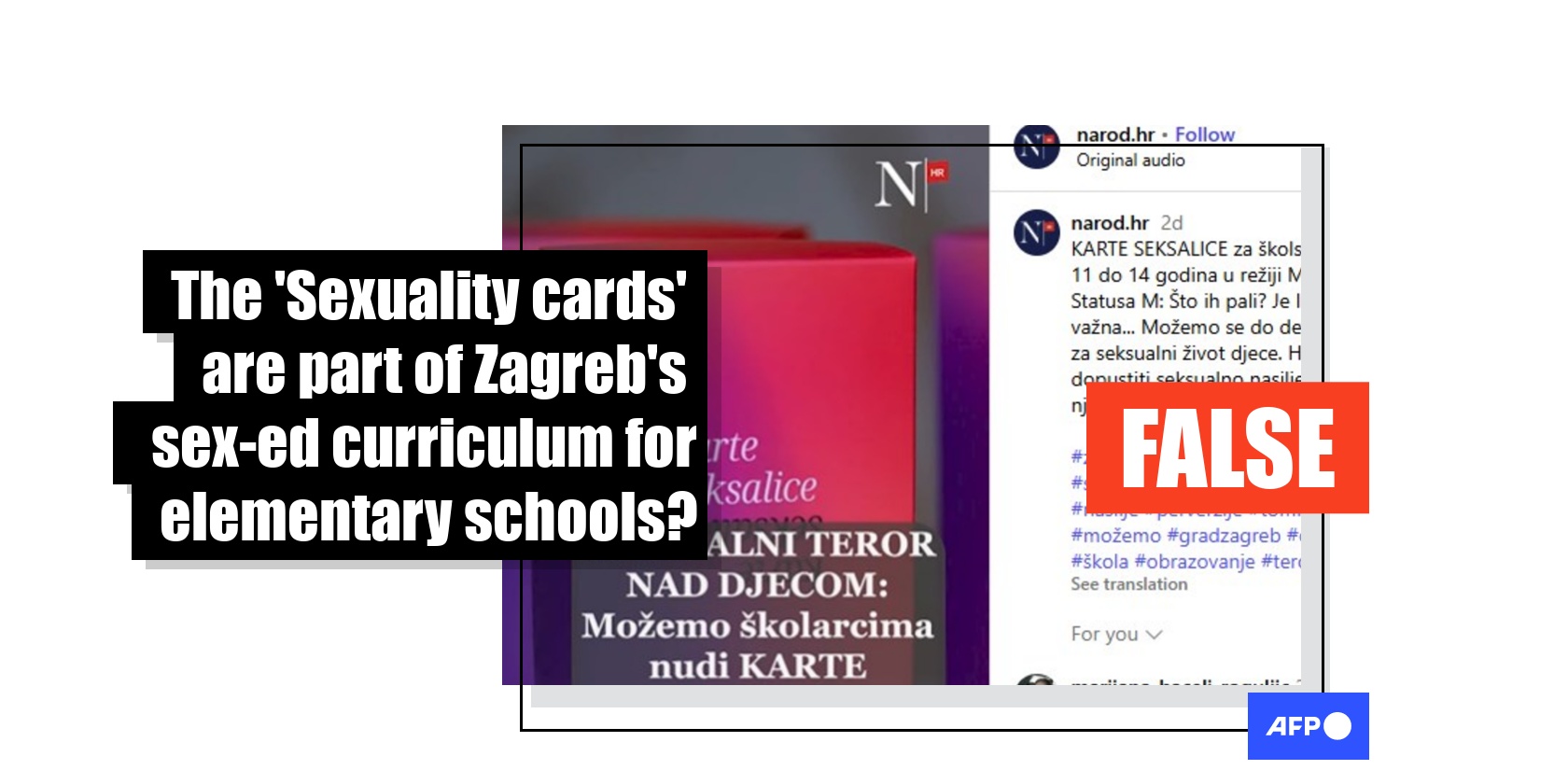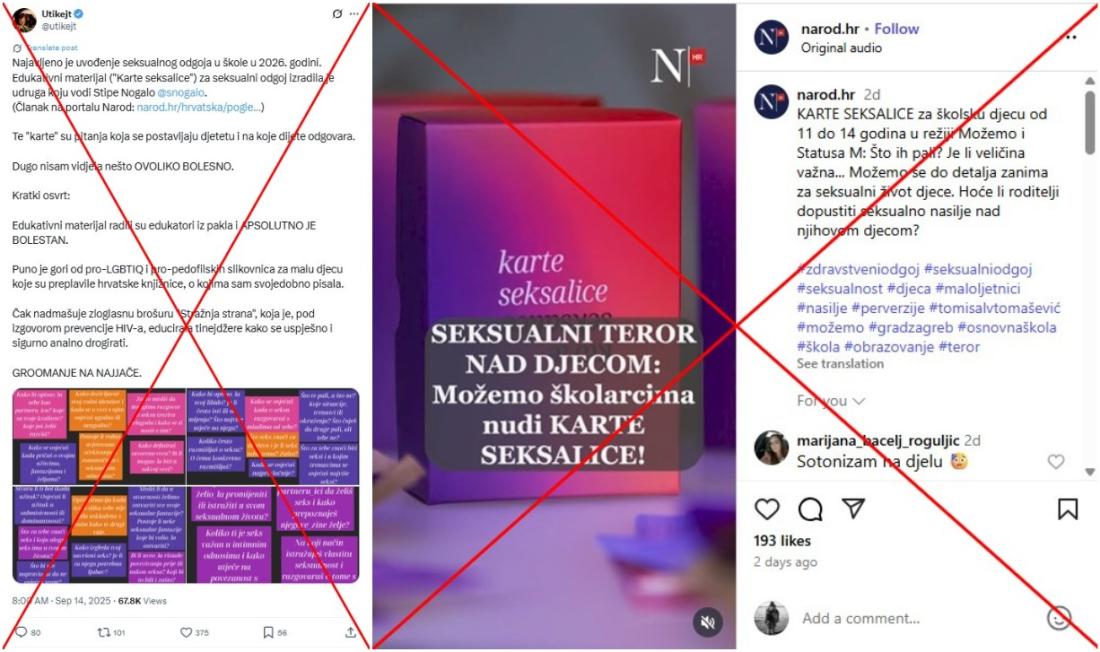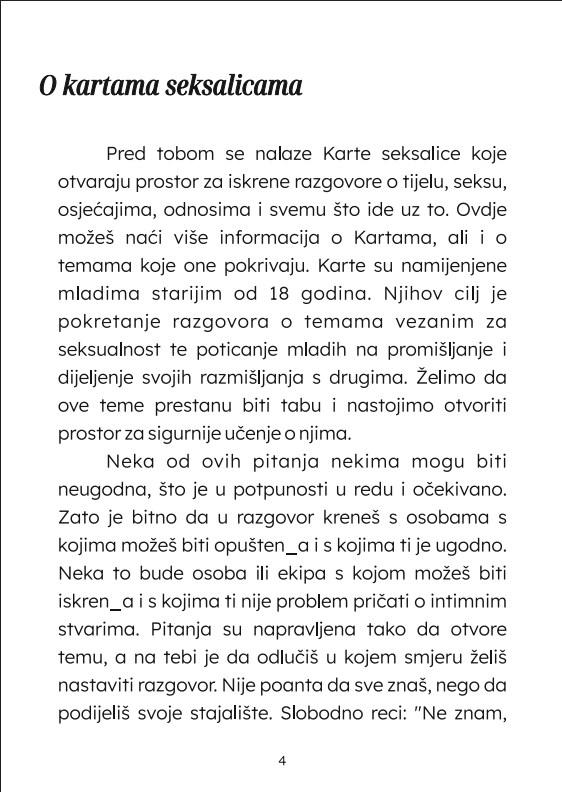
'Sexuality cards' are not part of Zagreb's planned health education course in schools
- Published on October 21, 2025 at 11:17
- 5 min read
- By Marion DAUTRY, AFP Belgrade
Efforts to introduce sexual education into Croatia's national school curriculum have stalled for over a decade. In September 2025, the city of Zagreb announced an expert committee tasked with developing a health education curriculum for local schools. But misleading claims soon surfaced alleging that the programme would include a deck of "sexuality cards" asking children intimate questions about sex and feelings. In reality, the NGO that created the cards supports sexual education but is not involved in designing the curriculum. Both the organisation and city authorities told AFP that the cards are not meant as educational material, and are intended for adults.
"Look at the 'Sexuality Cards' for school children by Možemo and Status M: What turns them on? Does size matter…" reads the headline of an article published by Narod.hr on September 13, 2025.
The article mentions a conference organised by the Croatian NGOs CESI and Status M on September 9, on the topic of "Comprehensive sex education in a local context". The article falsely states that the "sexuality cards" presented at the conference "are interested in the 'sexual life' of children".
"Those 'cards' are questions posed to the child and to which the child responds," alleges a post on X shared over a hundred times since September 14. The post contains screenshots of the cards displaying questions such as "Are there gendered expectations in romantic and sexual relationships?" and "How important is sex to you in intimate relationships and how does it affect your connection with your partner?"
Nikola Grmoja, an MP from the ultra-conservative party Most, shared screenshots of some of the cards on X, wrongly claiming that they are intended for Zagreb's elementary and secondary schools. Tomislav Sokol, an MEP from the conservative ruling party HDZ, also posted a picture of one of the cards on X which reads "Does pain ever give you pleasure? Do you feel pleasure in submissiveness or dominance?", alongside the claim that the green-left party Možemo that governs in Zagreb "wants to introduce this into schools through the back door as an extracurricular activity."
Some users on X also consulted Grok about the claims and received an incorrect answer.
The guidelines for the deck of cards, which can be found directly under the link to the cards on Status M's website (archived here and here), clearly state that they are intended for individuals over 18 years old. Nowhere in the description are they presented as educational material for schools or children. Participants at the conference also confirmed to AFP that there had been no confusion about their use.

The city of Zagreb announced on September 4 the launch of the process to introduce an extracurricular health education subject for students from grades 5 to 8, with the creation of an expert committee. The project is slated to begin in September 2026 (archived here).
Luka Juroš, in charge of education, sports and youth for the city of Zagreb, spoke about the plan at the September 9 conference, Croatian media reported (archived here). The new subject will have four components: healthy lifestyles, physical and mental health, addiction prevention and sexual and reproductive health.
But the conference was not solely dedicated to the future curriculum. It included other topics such as presentations on the outcomes of health and sexual education in Italy, Sweden and Croatian towns, with speakers and attendees from various institutions, healthcare and civil society organisations (archived here, here and here).
Cards designed for adults
As explained in the user's guide, the deck is "meant for young people above 18 years old". Nowhere is it stated that they are educational material for school. Rather, the cards are meant to be used among trusted friends to "start conversations about topics related to sexuality and encourage young people to reflect and share their thoughts with others."

"The cards are not intended for school-aged children. They have nothing to do with the process of introducing health education into Zagreb schools," Anamarija Sočo, president of Status M, which published the deck and co-organised the conference, said in an email to AFP on September 17, 2025.
"Our volunteers, young people - male and female students - expressed their desire for this kind of material. They are aware that many topics around sexuality are still taboo and they wanted to open a space for themselves and their peers to talk about it more easily, exchange experiences, learn and support each other," she added.
She also confirmed that the organisation is not involved in the city's expert committee in charge of developing the future curriculum. The list of experts was published by the city on September 3 (archived here).
AFP reached out to several of the conference's participants, who confirmed that the deck of "sexuality cards" was only presented as one example of the work done by organisations active in the broader topic of sexual education.
"They were not mentioned in the context of any kind of teaching material," Croatia's gender equality ombudswoman Višnja Ljubičić told AFP by email on September 18.
Zagreb deputy mayor Danijela Dolenec called the claims that the cards would be used in schools with young children "disinformation" in a press conference on September 17, 2025 (from 4:48). The cards "are not part of the health education programme of the city of Zagreb, nor will they be. They are not intended for children; they are not intended for school programmes," she said (archived here).
Sex ed in Croatia stalled
"Sex education is actually one of the key and necessary steps for preventing sexual violence precisely because it teaches children and young people about boundaries, what the body is, healthy sexuality, reproductive rights, consent," pedagogist and member of the city's expert committee Kristina Mihaljević explains in this video.
"Children and young people in Croatia primarily learn about sexuality via the internet and through conversations with peers, while the share of professionally transmitted and verified information is negligible," placing young people at increased risks of teen pregnancy and sexually transmitted diseases, ombudwoman Ljubičić told AFP.
As Faktograf recently explained, attempts at introducing sex ed in classrooms nationwide date back over a decade (archived here). A national curriculum was proposed in 2013 with a focus on healthy living; prevention of violent behavior; prevention of addiction; sexual and gender equality and responsible sexual behavior.
But opposition to the programme, including from the Catholic Church in Croatia and the right-wing HDZ party, blocked its implementation on the national level, leaving it to local authorities to come up with their own initiatives.
"Unfortunately, campaigns against sex education are often based on the blatant intention of disinforming and intimidating the public, using manipulative techniques to spread moral panic," Ljubičić told AFP.
She pointed out that the 2014 campaign "Don't touch the children" falsely alleged a link between sexual education in schools and pedophilia.
"Such disinformation campaigns are part of the trend of politicization and 'ideologization' of the field of human rights, trivializing them and reducing them to daily political worldview divisions, thereby harming education and training on issues of sexuality, gender equality and human rights," Ljubičić said.
The false claims about the "sexuality cards" also triggered hate speech.
"We have been exposed to attacks and threats for days, including of violence and death. Also, our members are slandered as pedophiles, sexual predators and the like. This is particularly problematic because some of them work as educators in schools," Sočo from Status M told AFP.
One user commented on X: "There should be a war! We have no other choice! There is no other remedy."
The Možemo party has previously been targeted by disinformation. AFP debunked another such instance here.
Copyright © AFP 2017-2026. Any commercial use of this content requires a subscription. Click here to find out more.
Is there content that you would like AFP to fact-check? Get in touch.
Contact us
